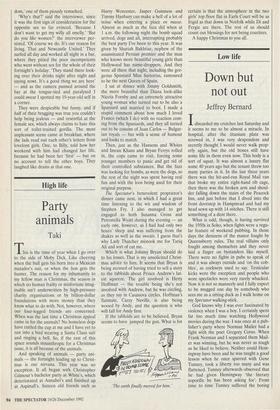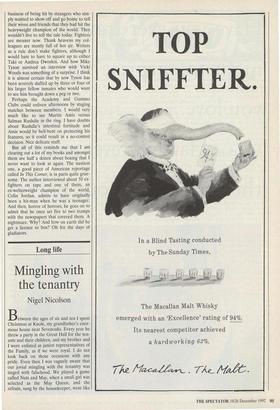Low life
Down but not out
Jeffrey Bernard
Idiscarded my crutches last Saturday and it seems to me to be almost a miracle. In hospital, after the titanium plate was screwed in, I was very despondent and secretly thought I would never walk prop- erly again, but the old bones still have some life in them even now. This body is a sort of squat. It was almost a luxury flat some 40 years ago but the tenant threw too many parties in it. In the last three years there was the hit-and-run Royal Mail van that broke my entire right-hand rib cage, then there was the broken arm and shoul- der falling down the stairs of the Peacock Inn, and just before that I dived into the front doorstep in Hampstead and had my head sewn up with 14 stitches. There is still something of a dent there.
What is odd, though, is having survived the 1950s in Soho, when fights were a regu- lar feature of weekend pubbing. In those days the denizens of the manor fought by Queensberry rules. The real villains only fought among themselves and they never laid a finger on bystanders like myself. There were no fights in pubs to speak of and it was always outside and 'on the cob- bles', as cockneys used to say. Testicular kicks were the exception and people who wore spectacles were very rarely whacked. Now it is not so mannerly and I fully expect to be mugged one day by somebody who sees me as a sitting duck as I walk home on my Spectator walking-stick.
God knows why I was ever fascinated by violence when I was a boy. I certainly spent far too much time watching Hollywood movies during the war. I was once at a pub- lisher's party where Norman Mailer had a fight with the poet Gregory Corso. When Frank Norman and I separated them Mail- er was winning, but he was never as tough as he liked to believe. Neither could Hem- ingway have been and he was taught a good lesson when he once sparred with Gene Tunney, took a liberty too many and was flattened. Tunney afterwards observed that he had given Hemingway 'the literary soporific he has been asking for'. From time to time Tunney suffered the boring business of being hit by strangers who sim- ply wanted to show off and go home to tell
their wives and friends that they had hit the heavyweight champion of the world. They wouldn't live to tell the tale today. Fighters are meaner now. Thank heavens my col- leagues are mostly full of hot air. Writers as a rule don't make fighters, although I would hate to have to square up to either Taki or Andrea Dworkin. And how Mike Tyson survived an interview with Vicki Woods was something of a surprise. I think it is almost certain that by now Tyson has been severely duffed up by three or four of his larger fellow inmates who would want to see him brought down a peg or two.
Perhaps the Academy and Gummo Clubs could enliven afternoons by staging matches between members. I would very much like to see Martin Arnis versus Salman Rushdie in the ring. I have doubts about Rushdie's intestinal fortitude and Amis would be hell-bent on protecting his features, so it could result in a no-contest decision. Nice delicate stuff.
But all of this reminds me that I am clearing out a lot of my books and amongst them are half a dozen about boxing that I never want to look at again. The nastiest one, a good piece of American reportage called In This Corner, is in parts quite grue- some. The author interviewed about 50 ex- fighters on tape and one of them, an ex-welterweight champion of the world, Cohn Jordan, admits to have originally been a hit-man when he was a teenager. And then, horror of horrors, he goes on to admit that he once set fire to two tramps with the newspapers that covered them. A nightmare. Why? And how on earth did he get a licence to box? Oh for the days of gladiators.











































































































 Previous page
Previous page